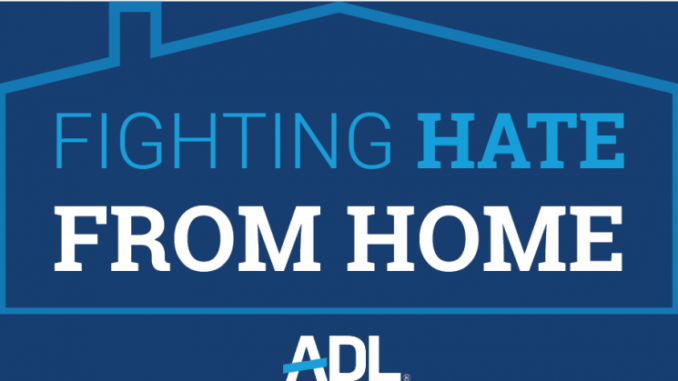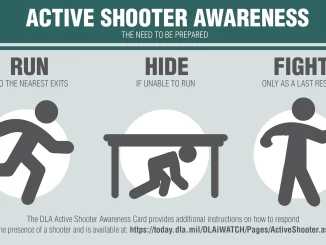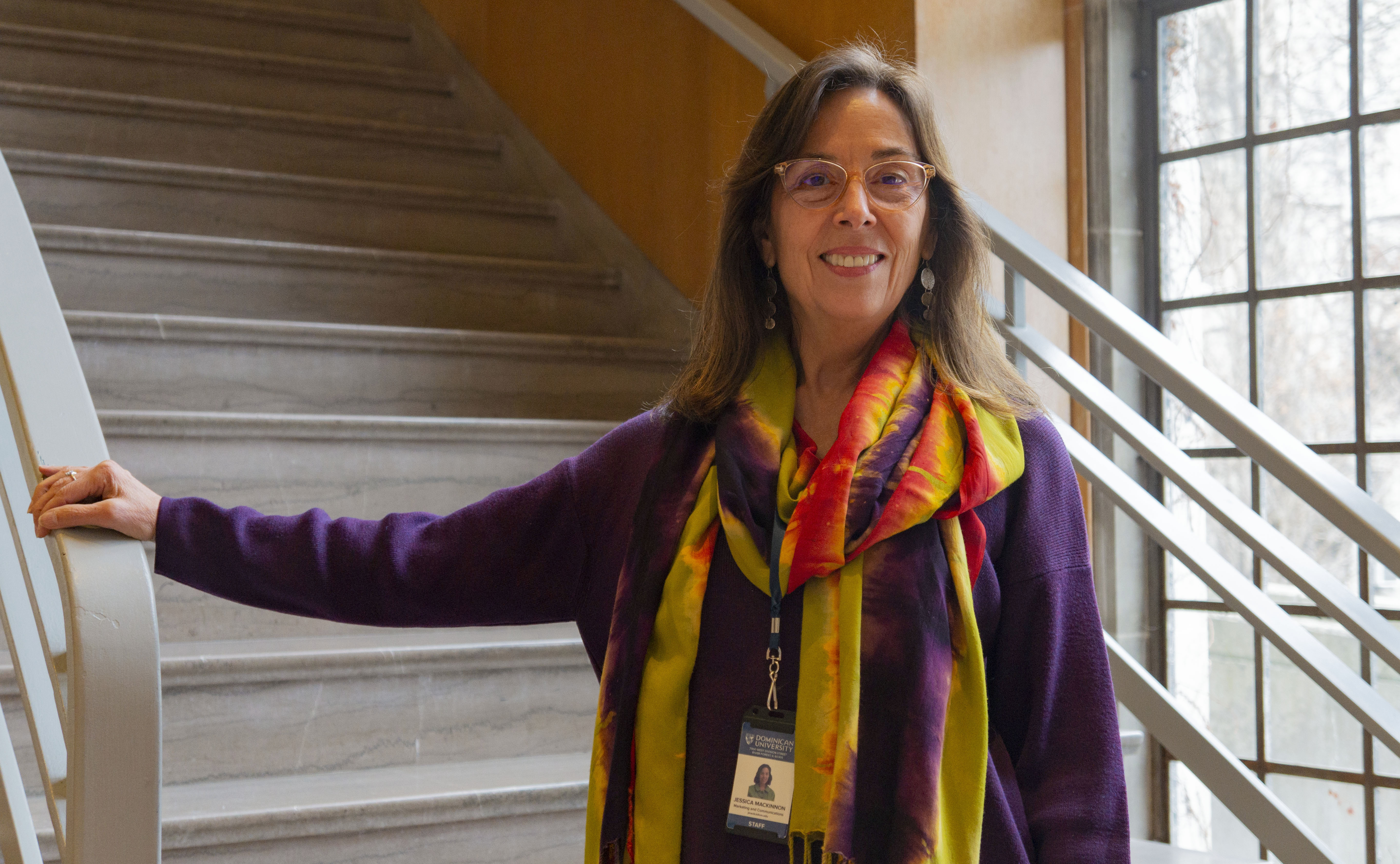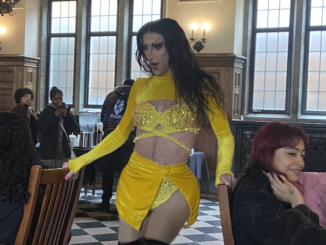
By Chelsea Zhao
(Feature Image from Anti-Defamation League website https://newengland.adl.org/)
The white supremacist stickers highlight greater need of understanding to promote equity and equality at Dominican University. On Thursday, October 24, at 1:50 p.m. a student reported to Campus Safety a Nazi sticker on a light pole. There were two stickers found on university. One of them was on Greenfield Street and the other near the ramp by the Rebecca Crown Library.
The group that put up the stickers is a white supremacist organization. The name of the group will not be revealed for the sake of publicity. The Anti-Defamation League identifies and explains white supremacist groups on their websites.
Campus Safety took special vigilance patrolling campus that day, to make sure no more stickers were found. Campus Safety were not able to find the person responsible for putting up the stickers. There are no camera images in locations where the stickers were found.
“They probably watched for people and or us to be walking around and if when there is nobody is when they assumingly did it,” Sasha Santiago, a Campus Safety Officer, said.
Santiago said from a security operation’s point, the stickers were not approved and needed to be taken down.
However, the student who reported the poster shows the importance of individual awareness for a greater university environment.
“But the good news is, with our see something say something model, we found out from someone came to tell us, which is really important, because we can’t be everywhere and community members have to also have eyes on campus,” Carol J. Seley, Director of Campus Safety and Risk, said.
“It is important to recognize that it was because a student took the initiative to document and report the incident that Campus Safety was able to respond quickly. That student should be acknowledged and thanked,” said President Donna M. Carroll in an email response.
“That’s student taking ownership of their campus and that’s what we want to promote,” Dr. Price said.
Incident Management Assessment Team (IMAT) addressed the issue and mentioned the ways to communicate with the community, prior to Dr. Radford-Hill sent out an email about the incident to the whole Dominican community, according to Seley.
There are not clear causes to why the stickers were put out. However, the social media page of the organization put out a call to its members to recruit on or around Halloween, according to Dr. Sheila Radford-Hill, the Chief Diversity Officer and Title IX Coordinator at Dominican University.
“I can’t speculate the rationale as to why they would post that, but I know what its effect is, its effect is to short circuit community. Its effect is to hinder inclusion efforts, its effect is to dampen a spirit of collaboration and to reinforce a false hierarchy of human value” John DeCostanza, Director of University Ministry, said.
“Campuses across the country are experiencing the impact of the divisive political climate in our country. Racial tensions and hate rhetoric are increasing. Dominican is not immune to these tensions, but I hope that we can be better — more conscious of bias and caring of each other. Many of the initiative introduced by the Office of Diversity, Equity and Inclusion are intended to help us develop as an inclusive and resilient community,” said President Carroll.
“I think in a small private liberal arts school, we value diversity and we try to create opportunities to teach and celebrate the diversity of all members on our campus” Dr. Barrington, Vice President of Student Success and Engagement, said.
In the past, the university has responded to similar situations by naming the incident as a bias incident, taking the down the poster, and removing graffiti. Dominican University also issue statements through email, video, and posters. One of them was a media campaign in 2015 called ‘Complicit No More’, released in response to a bias incident, according to Dr. Radford-Hill.
Dr. Radford-Hill also mentions the importance to look at the incidents collectively but responding to each individually.
Dr. Radford-Hill emphasized the importance of equipping staff and faculty to respond to individual incidents, equipping university to respond institutionally to bias incidents, and encouraging students to understand each other across their differences.
Two partnerships will collaborate with Dominican University on those issues. One is the Anti-Defamation League, which Dominican University is still applying for and the other is Truth, Racial Healing & Transcription (TRHT), which Dominican University has been working with since early last year.
TRHT is a community-based process that strive to change narrative of race, to encourage sharing of experiences, and to change policies and practices that promote racial or other social inequalities.
“The first thing you have to do with the truth racial healing and transformation process is to organize your community. That’s what we’ve been doing for the past year –we’ve been organizing. So now, we are about to launch something. As soon as I meet with the advisory council and get their permission, I can share it more broadly” Dr. Radford-Hill said.
“My hope is that we can continue to be part of efforts, broad efforts on campus, to build up spaces for shared living. I think that’s what’s at the heart of practices like Ofrenda for Día de los muertos, and the honoring of Dr. King in January, and we will be welcoming Michael Eric Dyson to campus…I think all of those things are important opportunities for the University to have conversation about what it means to engage in shared living,” DeCostanza said.
Dr. Price also mentioned the importance of diversity on campus and how issues like these are not coherent with the greater university environment.
“Most recently coming off of Hispanic Heritage Month, but soon looking forward to Black History Month and trying to find some other ways to celebrate our heritage on campus, so it’s really taking a proactive approach to the celebration and these such things are outliers. These are not the norm” Dr. Price said.
Dr. Radford-Hill also noted on campus organizations such as Social Justice advocates, Resident Advisors, El Centro workers, and Beloved Community.
“I use that to say that each of those programs [at Dominican University] cover the people that are in them like a blanket. If you are not in the program, maybe you don’t receive the benefits. So now we had to figure out how to change the climate, which is creating a quilt so that everyone can be protected from bias,” Dr. Radford-Hill reflected.
“I suspect that as we move forward into 2020, the election year, we may see somethings that we will have to grapple with and think about,” Dr. Radford-Hill said.



